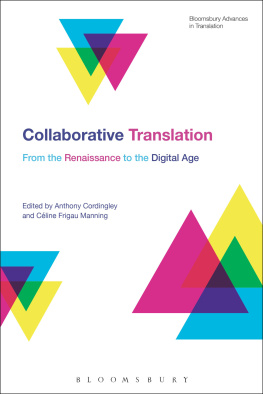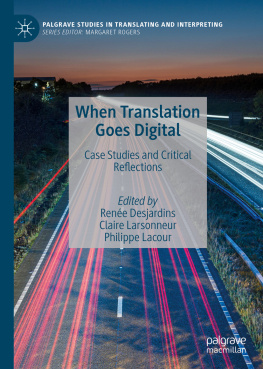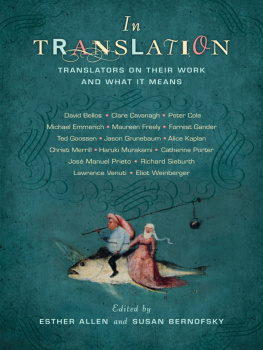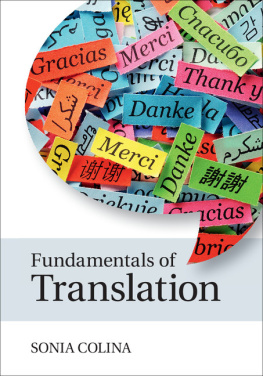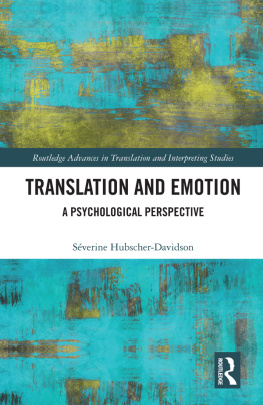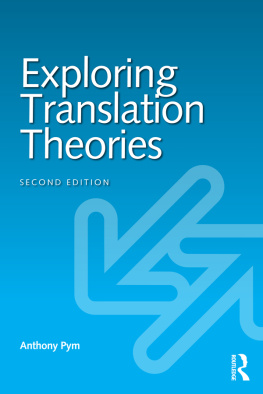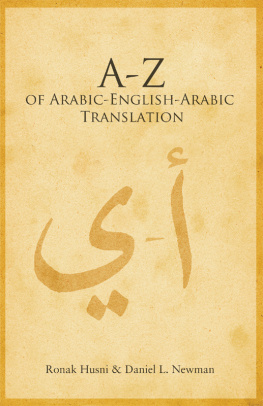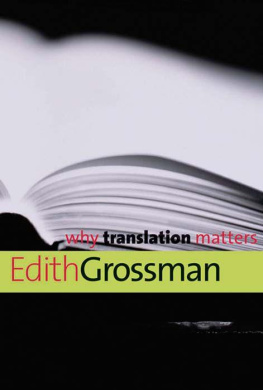Collaborative Translation
Bloomsbury Advances in Translation Series
Series Editor: Jeremy Munday, Centre for Translation Studies, University of Leeds, UK
Bloomsbury Advances in Translation Studies publishes cutting-edge research in the fields of translation studies. This field has grown in importance in the modern, globalized world, with international translation between languages a daily occurrence. Research into the practices, processes and theory of translation is essential and this series aims to showcase the best in international academic and professional output.
Other titles in the series:
Community Translation , Mustapha Taibi and Uldis Ozolins
Corpus-Based Translation Studies , edited by Alet Kruger, Kim Wallmach & Jeremy Munday
Global Trends in Translator and Interpreter Training , edited by Sverine Hubscher-Davidson & Micha Borodo
Music, Text and Translation , edited by Helen Julia Minors
Quality In Professional Translation , Joanna Drugan
Retranslation , Sharon Deane-Cox
The Pragmatic Translator , Massimiliano Morini
Translation, Adaptation and Transformation , edited by Laurence Raw
Translation and Translation Studies in the Japanese Context , edited by Nana Sato-Rossberg & Judy Wakabayashi
Translation as Cognitive Activity , Fabio Alves & Amparo Hurtado Albir
Translating For Singing , Mark Herman & Ronnie Apter
Translating Holocaust Lives , edited by Jean Boase-Beier, Peter Davies, Andrea Hammel and Marion Winters
Translation, Humour and Literature , edited by Delia Chiaro
Translation, Humour and the Media , edited by Delia Chiaro
Translating the Poetry of the Holocaust , Jean Boase-Beier
What Is Cultural Translation? , Sarah Maitland
Collaborative Translation
From the Renaissance to the Digital Age
Edited by
Anthony Cordingley and Cline Frigau Manning
Bloomsbury Academic
An imprint of Bloomsbury Publishing Plc

Contents
Olga Anokhina , a linguist and a researcher at the Institute for Modern Texts and Manuscripts (CNRS-ENS), works on the genesis of literary works by multilingual writers. She edited the collective volumes Multilinguisme et crativit littraire (2012) and crire en langues: littratures et plurilinguisme (2015). Her interests include the cognitive aspects of the written production, multilingualism and creation. Within ITEM, Olga Anokhina is head of the research team Multilingualism, translation, creation .
Beln Bistu is Associate Researcher in Comparative Literature for the Argentine Research Council (CONICET) and Assistant Professor of English at the Universidad Nacional de Cuyo. She specializes in translation history, with a focus on Renaissance collaborative and multilingual translation practices. Her publications in this field include The Task(s) of the Translator(s): Multiplicity as Problem in Renaissance European Thought (2011), winner of the A. Owen Aldridge prize, and the groundbreaking Collaborative Translation and Multi-Version Texts in Early Modern Europe (2013).
Anthony Cordingley is Associate Professor of English and Translation Studies at Universit Paris 8, presently on secondment to the University of Sydney as ARC Discovery Early Career Research Fellow. He edited Self-translation: Brokering Originality in Hybrid Culture (Bloomsbury 2013) and co-edited the 2015 issue of Linguistica Antverpiensia , Towards a Genetics of Translation. A literary scholar with a special interest in Samuel Beckett, digital editing and manuscript genetics he has published in journals such as Comparative Literature , Modern Philology and Journal of Modern Literature . He is completing the Comment cest/How It Is module of the Beckett Digital Manuscript Project.
Michael Cronin is Professor of Translation Studies at Dublin City University. He is the author of Translating Ireland: Translation, Languages and Identity (Cork University Press, 1996); Across the Lines: Travel, Language, Translation (Cork University Press, 2000); Translation and Globalization (London, Routledge, 2003); Translation and Identity (Routledge, 2006); Translation Goes to the Movies (Routledge, 2009) and Translation in the Digital Age (Routledge, 2013). He is a member of the Royal Irish Academy and of the Academia Europeae.
Franoise Decroisette is Emeritus Professor at Universit Paris 8. A specialist of Italian theatrical practices from the sixteenth to the twenty-first centuries, she has translated into French Basiles Le Conte des Contes , de Sommis Les Quatre dialogues en matire de reprsentations thtrales , librettos, comedies written by Goldoni for various publishers and directors (Lassalle, Morin, Cals, Hollund), as well as Gozzis LOiseau Vert . She also oversaw the collaborative translation of Gozzis Mmoires inutiles.
Jean-Louis Fournel is Professor of Italian Studies at Universit Paris 8, member of the Institut Universitaire de France, of the Laboratoire dtudes romanes and the UMR Triangle. With J.-C. Zancarini, he translated works by Machiavelli, Guicciardini and Savonarola. His more recent books are La Grammaire de la rpublique (2009), La cit du soleil et les territoires des hommes (2012) and, as editor, Les mots de la guerre dans lEurope de la Renaissance (with M.-M. Fontaine, 2015).
Cline Frigau Manning is Associate Professor of Italian and Theatre Studies at Universit Paris 8, and a member of the Institut Universitaire de France. A specialist of theatre and opera, she was resident scholar at the Villa Medici. Her work has appeared in Opera Quarterly and Nineteenth-Century Music , and she is the author of Chanteurs en scne. Lil du spectateur au Thtre-Italien (1815-1848) (Champion, 2014). Founder of the translation collective La Langue du bourricot, which has published translations of plays by Matteo Bacchini, Antonio Moresco, and Emma Dante, she is coediting with Marie Nadia Karsky a volume on theatrical translation.
Patrick Hersant teaches English literature and translation at Universit Paris 8. His research concerns modern and contemporary poetry. Recent publications include a study of the translations of Kubla Khan ( S. T. Coleridge: In Xanadu , Presses universitaires de Bordeaux, 2016) and the forthcoming Traduire avec lauteur , an edited collection devoted to author-translator collaboration. As a translator, he has published French versions of British poets such as Philip Sydney, R. L. Stevenson, Edward Lear and Seamus Heaney.
Miguel ngel Jimnez-Crespo holds a PhD in Translation and Interpreting Studies from the University of Granada, Spain. He is an associate professor in the Department of Spanish and Portuguese, Rutgers University, where he directs the MA and undergraduate certificate in Spanish-English Translation and Interpreting. He is the author of Translation and Web Localization published by Routledge in 2013, and his papers have appeared in translation studies journals such as Target , Meta , Perspectives , Lingistica Antverpiensia , TIS: Translation and Interpreting Studies , Jostrans as well as Translation and Interpreting . He is the assistant editor of the upcoming John Benjamins journal JIAL: the Journal of Internationalization and Localization .
Ika Kaminka studied art history at the University of Bergen and presently works as translator of Japanese literature into Norwegian. She has translated a number of books by Haruki Murakami in addition to Natsume Sseki and Junichir Tanizaki. In 2012 she was awarded the Bastian Prize for her rendering of Murakamis 1Q84 . Kaminka is presently chair of the Norwegian Association of Literary Translators.

